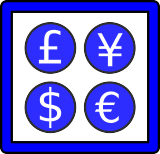Currency trading offers excellent opportunities for private and institutional investors and traders.
The reason is that there are a large number of currency pairs that usually offer sufficient volatility (price fluctuations) for trading.
In addition, most currencies are very liquid and transaction costs are low.
In this article, I’d like describe a few important principles of currency trading.
Inhaltsverzeichnis
Currency trading: forex or futures?
The basic question facing both traders and active investors is which instrument to use when trading currencies. The following options are available:

- Currency futures
- Forex trading
- Currency options
- CFDs on currencies
- Currency certificates (structured products)
- Currency warrants
I am not a fan of financial derivatives that are not traded on a regulated exchange.
That eliminates pretty much everything besides currency futures (currency forward contracts) and currency options.
Both instruments are traded on the regulated exchanges in the United States.
Currency trading without a regulated exchange
The major disadvantage of currency certificates, warrants, and CFDs is that prices are not set on a central exchange.
The selected forex broker or bank usually takes the other side of the trade.
So you’re basically trading against the broker or bank, which means that pricing is not transparent.
In addition, there are relatively high transaction costs in the form of wider bid-ask spreads.
In very fast markets, there’s a risk that neither the broker nor the bank will make a market and that you won’t be able to close your positions – or that you’ll only be able to close them slowly.
There is no regulated exchange for forex
Currency trading in the foreign exchange (“forex”) market does not take place on a regulated exchange.
In fact, there is no forex exchange at all. Trading is decentralized.
Like traders of derivatives, currency traders and investors usually trade against their forex broker.
This means that there are the same disadvantages as CFDs, structured products, and warrants.
What brokers can you use to trade currencies?
One option is to trade currencies through Interactive Brokers, which provides direct access to interbank quotes.
We also recommend the JFD Bank for currency trading and currency CFDs.
But even with these brokers, traders and investors ultimately have no recourse to a neutral arbitration body in the event of problems with order execution.
Another issue is the safety of the deposited funds if the broker goes bankrupt.
Currency futures are a viable, professional alternative
Consequently, the only real option is to trade futures contracts on the most important currency pairs with acceptable volume on the Chicago Mercantile Exchange (CME):
Concluding remarks on currency trading
Trading currencies through the interbank system is feasible because of the many advantages it brings (around 50 tradable currency pairs, freely determinable position size).
Transaction costs and spreads are low.
Liquidity is always sufficient for private traders.
If you want to trade larger positions and avoid being at the mercy of a forex broker, we strongly recommend currency futures.
But there are a few disadvantages as well: there are only eight tradable currency futures contracts, and it is not possible to make gradual adjustments to position size.
If you have questions or comments about this article, please post them in the comments section below.
Read more: